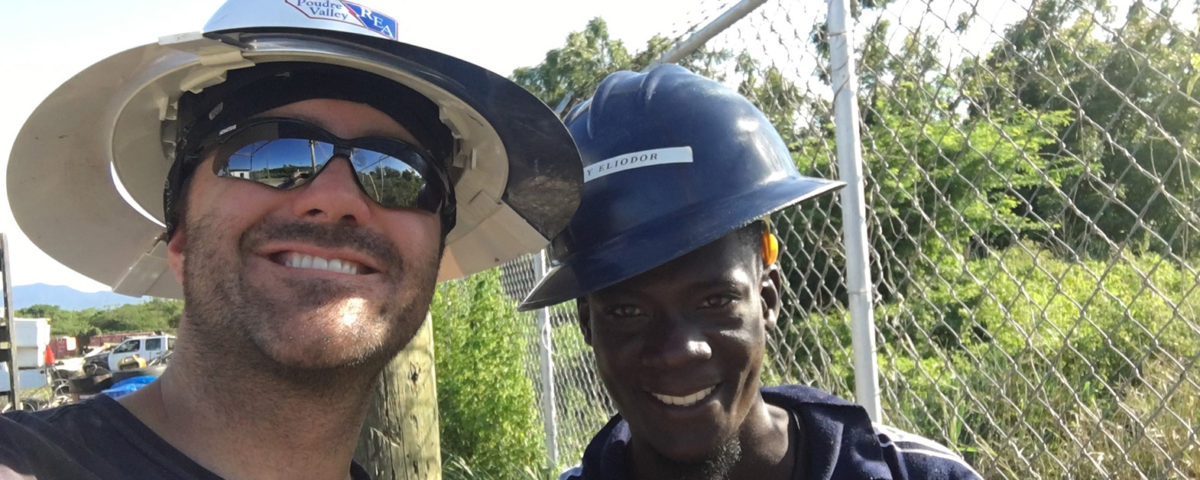
Open hearts and willing, hard-working hands. That’s how a few PVREA linemen found themselves pulling wire and climbing poles in Haiti.
It’s a project that’s been on the hearts of co-ops for years. We helped electrify America back in the 1930s and 1940s, and now we’re helping nations across the globe bring electricity to areas who have lived without for too long.
Since 1962, NRECA International has worked on establishing and strengthening rural utilities across the world where poverty could be helped with access to electricity. Electric co-ops across the nation have been sending linemen and donating tools and trucks to NRECA International for a number of years and PVREA wanted to help be a part of the cause.
So PVREA asked for volunteers and sent linemen Dane Hanson, Corey Haugo and Clay Sharp to the area of Caracol, Haiti– an area that up until a few years ago had no electricity. They took off on March 26 and showed up on an island where people bustled about everywhere, speaking a mix of French, Portuguese, Creole and Spanish. They chuckled about the taxis loaded down with 15 people, the constant noise of people bustling about through the streets and the food that was a little hard to eat when they first arrived.
Right away they started helping the local linemen with what the PVREA linecrews do best – bring electricity to local families. Dane, Corey and Clay worked with Bob, the local Operations Manager, on different job sites every day. The local power company, who is hoping to become a cooperative, wanted to take advantage of the skill set the American lineworkers have to get specialty projects done. Dane, Corey and Clay soon found out that linework in Haiti is very different, and much more challenging.
“We take for granted the tools we have. In Haiti we carried poles through alleyways, set poles by hand, and doing that by hand is just a different way of life,” Corey commented.
At PVREA, bucket trucks are equipped with augers to dig a big hole for a pole; in Haiti, they dig the holes by hand. Line trucks in the U.S. are also equipped with equipment to carry a pole right to a job site, and set it with the truck. In Haiti, they lift the heavy poles on their shoulders, or use slings, to carry them through small alley-ways and between houses to the hand-dug hole.
The language barrier also proved difficult, but not impossible, to work alongside the Haitians.
“It’s hard to communicate with people who don’t understand what you’re saying, but it’s kind of neat how through linework you can work with guys and get the same tasks done, and be on the same page without having to actually communicate through words,” Clay remarked.
By the end of the trip, what was most rewarding to the PVREA linemen was seeing families get electricity for the first time.
Dane related it to the 1930s.
“Our grandparents might say they remember when the local power company brought electricity to their home for the first time back in the 1930s. Now we’ve been a part of that today for those young kids in Haiti. It’s like stepping back in time,” Dane commented.
“To see someone get power for the very first time was a really cool experience,” Clay said.
The last thing we asked these three guys: “Would you go back?”
All with a nod of the head and a smile on their face replied, “Most definitely.”
Check out more pictures on the co-op’s Facebook page.